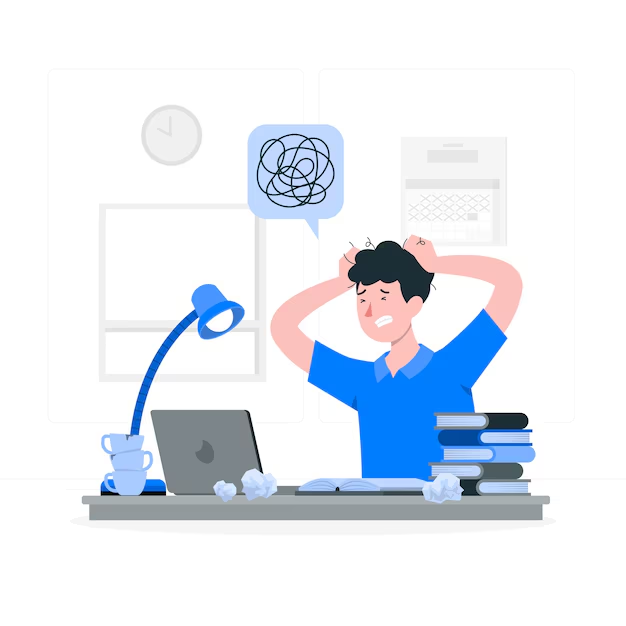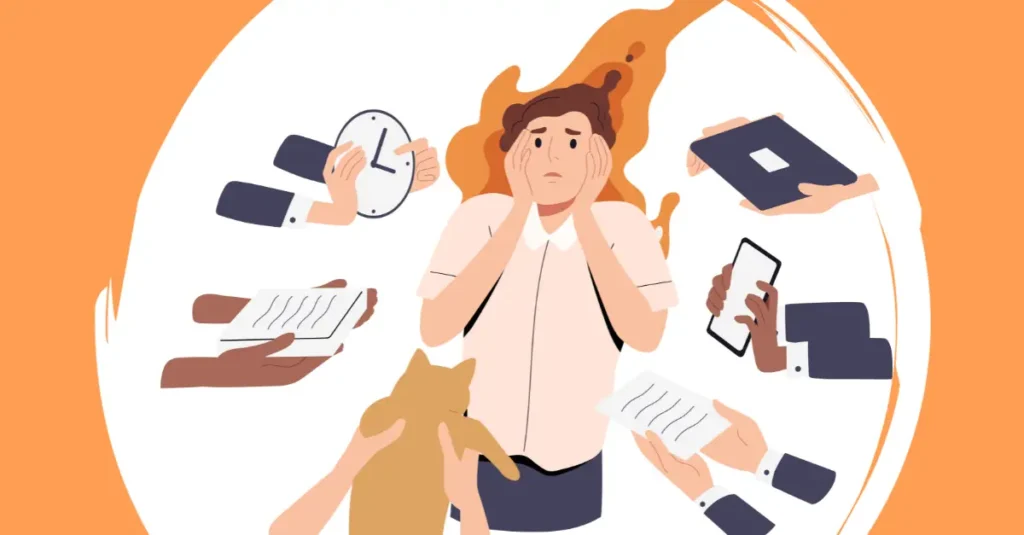Introduction
Exam have always been a pivotal part of academic life, often acting as gateways to future opportunities. However, for many students, these milestones bring with them a formidable challenge: stress. Exam stress is a universal phenomenon, and while it can be a motivator, excessive stress can impair performance, harm mental health, and diminish overall well-being.

Read More- Mental Health
The Psychology of Exam Stress
Examination stress is the body’s response to the perceived pressure of performing well in tests or assessments. It is driven by a complex interplay of cognitive, emotional, and physiological factors.
- Fear of Failure- The fear of underperforming is a significant trigger. Psychologists argue that societal expectations, parental pressure, and self-imposed high standards exacerbate this fear (Putwain, 2009). Students often equate examination results with self-worth, creating a high-stakes environment.
- Cognitive Appraisal- Stress arises when students perceive the demands of an exam to exceed their ability to cope. This evaluation process, known as “cognitive appraisal,” plays a crucial role in stress levels (Lazarus & Folkman, 1984). Positive appraisals lead to motivation, while negative ones can induce panic.
- Physiological Response- The body reacts to stress by activating the “fight or flight” response. This releases adrenaline and cortisol, causing physical symptoms like a racing heart, sweaty palms, and difficulty concentrating (McEwen, 2004). While this response can heighten alertness in moderation, chronic activation disrupts cognitive function.
- Catastrophic Thinking- Students under stress often engage in catastrophic thinking, imagining the worst-case scenario. Phrases like “If I fail this exam, my life is over” are common, amplifying anxiety and reducing the ability to think rationally (Salkovskis et al., 2000).
Effects of Examination Stress
Excessive stress has wide-ranging effects, influencing mental, physical, and academic outcomes.
- Mental Health- Persistent examination stress is linked to anxiety disorders and depression. Studies show that high-stakes testing environments increase students’ risk of developing long-term psychological issues (Denscombe, 2000).
- Physical Health- Stress manifests physically through headaches, sleep disturbances, and weakened immunity. Chronic stress has been associated with conditions like hypertension and gastrointestinal issues (Chrousos, 2009).
- Academic Performance- Moderate stress can enhance focus and productivity—a phenomenon known as “eustress.” However, excessive stress impairs memory retrieval and decision-making, often leading to poorer performance (Yerkes & Dodson, 1908).
Dealing with Examination Stress
Managing examination stress requires a multifaceted approach, combining psychological techniques, lifestyle changes, and practical preparation.
1. Psychological Techniques
Some psychological techniques can help combat severe examination stress, these include-
- Cognitive Restructuring- Cognitive restructuring helps students challenge negative thought patterns and replace them with constructive ones. For instance, reframing “I’ll fail” into “I’ll do my best, and it’s okay if it’s not perfect” reduces anxiety (Beck, 2011).

- Mindfulness and Relaxation Techniques- Practices like meditation, deep breathing, and progressive muscle relaxation calm the mind and reduce the physiological symptoms of stress. A study by Kabat-Zinn et al. (1992) found mindfulness significantly decreased anxiety in students during exams.
- Visualization and Positive Affirmations- Encouraging students to visualize success and repeat positive affirmations can boost confidence and reduce self-doubt. This taps into the power of the subconscious mind to create a more optimistic outlook.
2. Practical Exam Preparation
While examination anxiety should be dealt with well in advance, there are some ways to manage it using techniques like-
- Time Management- Effective planning reduces last-minute cramming, a primary source of stress. Tools like planners or apps can help students allocate time for study, breaks, and recreation.

- Active Learning Techniques- Techniques such as summarizing, self-testing, and teaching others are more effective than passive reading. They build confidence in the material, reducing the fear of uncertainty (Roediger & Butler, 2011).
- Practice Under Simulated Conditions- Taking mock exams under timed conditions helps acclimate students to the test environment, reducing performance anxiety.
Read More- Overcoming Bad Habits
3. Lifestyle Modifications
Certain lifestyle modifications could include the following-
- Regular Exercise- Physical activity releases endorphins, which are natural stress relievers. Even 30 minutes of aerobic exercise can significantly reduce anxiety levels (Ratey, 2008).
- Healthy Diet- A balanced diet with whole grains, fruits, vegetables, and protein provides sustained energy and supports cognitive function. Avoiding caffeine and sugar prevents energy crashes that exacerbate stress.
- Adequate Sleep- Sleep is critical for memory consolidation and emotional regulation. Encouraging consistent sleep schedules, even during exam periods, is essential.
4. Building Resilience
Resilience is the ability to continue functioning despite serious problems to adaptation, some ways to cultivate resilience include-
- Growth Mindset- Teaching students to view challenges as opportunities to learn fosters resilience. Carol Dweck’s (2006) research highlights the importance of a growth mindset in reducing fear of failure.
Read More- Growth Mindset
- Social Support- Talking to friends, family, or counselors alleviates stress. Sharing concerns often makes problems seem more manageable (Cohen & Wills, 1985).
- Gratitude Practice- Cultivating gratitude helps shift focus from stressors to positive aspects of life, reducing overall stress levels (Emmons & McCullough, 2003).
Read More- Gratitude Journal
Fun but Effective Stress-Busting Tips
Let’s add a touch of humor to these strategies—because laughter, after all, is a proven stress reliever.
- Dance Like No One’s Watching- Channel Beyoncé in your bedroom. Dancing is a fabulous way to shake off stress and break a sweat.
- Stress-Baking (and Eating)- Bake some cookies. The science: Kneading dough is therapeutic. The bonus: You get cookies.
- Talk to Your Plants- Share your exam woes with a houseplant. They won’t judge, and who knows—they might grow better with all that attention.
Conclusion
Examination stress, while a common experience, need not be debilitating. By understanding its psychological underpinnings and adopting practical strategies, students can transform stress into a driving force for success. Parents, teachers, and institutions must collaborate to create environments that prioritize learning and mental health over mere performance metrics.
In the end, remember: exams are important, but they don’t define your worth. Stay calm, take a deep breath, and give it your best shot. The rest will fall into place.
References
Beck, A. T. (2011). Cognitive therapy: Basics and beyond. Guilford Press.
Chrousos, G. P. (2009). Stress and disorders of the stress system. Nature Reviews Endocrinology, 5(7), 374–381.
Cohen, S., & Wills, T. A. (1985). Stress, social support, and the buffering hypothesis. Psychological Bulletin, 98(2), 310.
Denscombe, M. (2000). Social conditions for stress: Young people’s experience of doing GCSEs. British Educational Research Journal, 26(3), 359–374.
Dweck, C. S. (2006). Mindset: The new psychology of success. Random House.
Kabat-Zinn, J., et al. (1992). Three-year follow-up and clinical implications of a mindfulness meditation-based stress reduction intervention in the treatment of anxiety disorders. General Hospital Psychiatry, 15(3), 199–207.
Lazarus, R. S., & Folkman, S. (1984). Stress, appraisal, and coping. Springer.
McEwen, B. S. (2004). Protective and damaging effects of stress mediators: Central role of the brain. Dialogues in Clinical Neuroscience, 6(2), 367–381.
Putwain, D. W. (2009). Assessment and examination stress in Key Stage 4. British Educational Research Journal, 35(3), 391–411.
Roediger, H. L., & Butler, A. C. (2011). The critical role of retrieval practice in long-term retention. Trends in Cognitive Sciences, 15(1), 20–27.
Subscribe to PsychUniverse
Get the latest updates and insights.
Join 3,044 other subscribers!
Niwlikar, B. A. (2025, January 9). What is Exam Stress and Discover 4 Easy Ways to Deal With It. PsychUniverse. https://psychuniverse.com/exam-stress/



